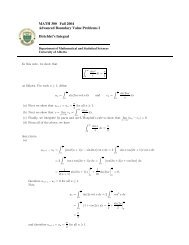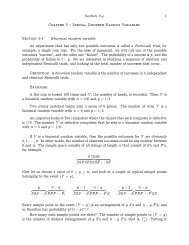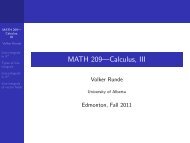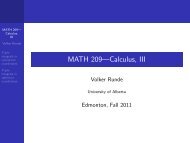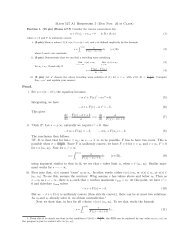Math 411: Honours Complex Variables - University of Alberta
Math 411: Honours Complex Variables - University of Alberta
Math 411: Honours Complex Variables - University of Alberta
You also want an ePaper? Increase the reach of your titles
YUMPU automatically turns print PDFs into web optimized ePapers that Google loves.
12 CHAPTER 2. COMPLEX DIFFERENTIATION<br />
(ii) f is totally differentiable at z0 (in the sense <strong>of</strong> multivariable calculus), and the<br />
Cauchy–Riemann differential equations<br />
hold.<br />
Pro<strong>of</strong>. (i) =⇒ (ii): Define<br />
∂u<br />
∂x (z0) = ∂v<br />
∂y (z0) and<br />
T: C → C, z ↦→ f ′ (z0)z,<br />
∂u<br />
∂y (z0) = − ∂v<br />
∂x (z0)<br />
and note that<br />
�<br />
|f(z)−f(z0)−T(z −z0)| �<br />
= �<br />
f(z)−f(z0)<br />
|z −z0| � −f<br />
z −z0<br />
′ �<br />
�<br />
(z0) �<br />
� → 0<br />
as z → z0. Therefore, f is totally differentiable at z0. From multivariable calculus, it<br />
follows that the matrix representation <strong>of</strong> T with respect to the standard basis <strong>of</strong> R is<br />
the Jacobian <strong>of</strong> f, i.e. � �<br />
ux(z0) uy(z0)<br />
Jf(z0) = .<br />
vx(z0) vy(z0)<br />
Since T is C-linear, Lemma 2.1 yields that<br />
ux(z0) = vy(z0) and uy(z0) = −vx(z0).<br />
(ii) =⇒ (i): Since f is totally differentiable at z0, we have a unique R-linear map<br />
T : C → C such that<br />
|f(z)−f(z0)−T(z −z0)|<br />
lim<br />
= 0.<br />
z→z0 |z −z0|<br />
Asweknowfrommultivariablecalculus, T isrepresented byJf(z0)withrespect tothe<br />
standard basis <strong>of</strong> R2 . Since the Cauchy–Riemann differential equations are supposed<br />
to hold, Jf(z0) is <strong>of</strong> the form described in Lemma 2.1(iv). By Lemma 2.1, there thus<br />
exists c ∈ C such that T(z) = cz for all z ∈ C. It follows that<br />
� �<br />
�<br />
�<br />
f(z)−f(z0) �<br />
� −c�<br />
z � −z0<br />
= |f(z)−f(z0)−c(z −z0)|<br />
→ 0<br />
|z −z0|<br />
as z → z0. Hence, f is complex differentiable at z0.<br />
Remark. In the situation <strong>of</strong> Theorem 2.1, we have<br />
f ′ � �� �<br />
ux(z0) uy(z0) 1<br />
(z0)1 =<br />
= ux(z0)+ivx(z0)<br />
vx(z0) vy(z0) 0<br />
as well as<br />
so that<br />
f ′ (z0)i =<br />
� ux(z0) uy(z0)<br />
vx(z0) vy(z0)<br />
�� 0<br />
1<br />
�<br />
= uy(z0)+ivy(z0),<br />
f ′ (z0) = ux(z0)+ivx(z0) = vy(z0)−iuy(z0).



